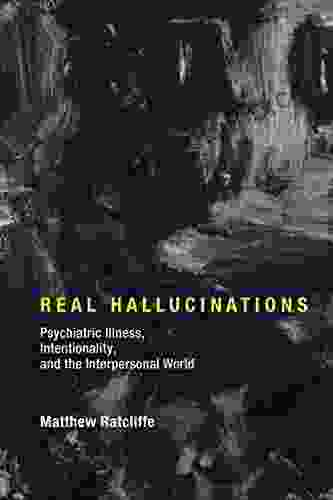Philosophical Perspectives on Psychiatric Illness, Intentionality, and the Interpersonal World

Psychiatric illness is a complex and multifaceted phenomenon that has been the subject of extensive research and debate. While there is no single universally accepted definition of psychiatric illness, it is generally understood to refer to a mental disFree Download that causes significant distress or impairment in social, occupational, or other important areas of functioning.
4 out of 5
| Language | : | English |
| File size | : | 1222 KB |
| Text-to-Speech | : | Enabled |
| Screen Reader | : | Supported |
| Enhanced typesetting | : | Enabled |
| Word Wise | : | Enabled |
| Print length | : | 360 pages |
One of the key challenges in understanding psychiatric illness is the question of intentionality. Intentionality is the capacity to have intentional states, such as beliefs, desires, and fears. It is a fundamental aspect of human consciousness and plays a central role in our interactions with the world around us.
In the context of psychiatric illness, intentionality can be affected in a number of ways. For example, people with schizophrenia may experience delusions or hallucinations that are not based in reality. People with depression may have difficulty experiencing pleasure or motivation. And people with anxiety disFree Downloads may be constantly worried or fearful, even in the absence of any real threat.
The impact of psychiatric illness on intentionality can have a profound impact on the interpersonal world. People with psychiatric illness may have difficulty communicating their thoughts and feelings to others. They may be withdrawn or isolated, and they may have difficulty forming and maintaining relationships.
The philosophical study of psychiatric illness, intentionality, and the interpersonal world is a relatively new field. However, it is a rapidly growing field, and there is a growing body of research that is shedding light on the complex relationship between these three phenomena.
In this article, we will explore some of the key philosophical perspectives on psychiatric illness, intentionality, and the interpersonal world. We will begin by discussing the phenomenological approach to psychiatric illness, which focuses on the lived experience of people with mental illness. We will then discuss the hermeneutic approach, which emphasizes the importance of interpretation in understanding psychiatric illness. Finally, we will discuss the pragmatic approach, which focuses on the practical implications of psychiatric illness for the interpersonal world.
The Phenomenological Approach
The phenomenological approach to psychiatric illness is based on the idea that the best way to understand mental illness is to listen to the experiences of people who have it. Phenomenologists believe that psychiatric illness is not simply a collection of symptoms, but rather a unique way of experiencing the world.
One of the key pioneers of the phenomenological approach to psychiatric illness was Karl Jaspers. Jaspers argued that psychiatric illness is characterized by a loss of what he called "existential freedom." Existential freedom is the ability to make choices and to shape one's own life. Jaspers believed that people with psychiatric illness lose this freedom and become trapped in a world of their own making.
Another important phenomenologist who wrote about psychiatric illness was Martin Heidegger. Heidegger argued that psychiatric illness is a disruption of the "being-in-the-world." The being-in-the-world is the way that we experience ourselves as part of the world around us. Heidegger believed that people with psychiatric illness lose their sense of being-in-the-world and become alienated from themselves and others.
The phenomenological approach to psychiatric illness has been influential in a number of ways. First, it has helped to shift the focus of psychiatric research from the study of symptoms to the study of the lived experience of people with mental illness. Second, it has helped to challenge the idea that psychiatric illness is a sign of weakness or moral failing. Third, it has helped to create a more compassionate and understanding approach to the treatment of psychiatric illness.
The Hermeneutic Approach
The hermeneutic approach to psychiatric illness is based on the idea that understanding mental illness requires interpretation. Hermeneuticists believe that there is no one true or objective way to understand psychiatric illness, but rather that our understanding is always shaped by our own experiences and beliefs.
One of the key pioneers of the hermeneutic approach to psychiatric illness was Hans-Georg Gadamer. Gadamer argued that psychiatric illness is a form of communication. He believed that people with psychiatric illness are trying to communicate something to us, but that we may not always be able to understand what they are saying.
Another important hermeneuticist who wrote about psychiatric illness was Paul Ricoeur. Ricoeur argued that psychiatric illness is a form of suffering. He believed that people with psychiatric illness are suffering from a loss of meaning in their lives. Ricoeur believed that the goal of psychiatric treatment should be to help people find meaning in their lives.
The hermeneutic approach to psychiatric illness has been influential in a number of ways. First, it has helped to shift the focus of psychiatric research from the study of symptoms to the study of the meaning of psychiatric illness. Second, it has helped to challenge the idea that psychiatric illness is a sign of weakness or moral failing. Third, it has helped to create a more compassionate and understanding approach to the treatment of psychiatric illness.
The Pragmatic Approach
The pragmatic approach to psychiatric illness is based on the idea that the best way to understand mental illness is to focus on its practical implications. Pragmatists believe that psychiatric illness is not simply a matter of symptoms or meaning, but rather a way of living in the world.
One of the key pioneers of the pragmatic approach to psychiatric illness was William James. James argued that psychiatric illness is a form of adaptation. He believed that people with psychiatric illness are trying to adapt to a difficult or challenging situation. James believed that the goal of psychiatric treatment should be to help people find more effective ways of coping with their situation.
Another important pragmatist who wrote about psychiatric illness was John Dewey. Dewey argued that psychiatric illness is a form of social pathology. He believed that psychiatric illness is caused by the failure of society to provide people with the resources they need to live a healthy and productive life. Dewey believed that the goal of psychiatric treatment should be to help people reintegrate into society.
The pragmatic approach to psychiatric illness has been influential in a number of ways. First, it has helped to shift the focus of psychiatric research from the study of symptoms to the study of the practical implications of psychiatric illness. Second, it has helped to challenge the idea that psychiatric illness is a sign of weakness or moral failing. Third, it has helped to create a more compassionate and understanding approach to the treatment of psychiatric illness.
The philosophical study of psychiatric illness, intentionality, and the interpersonal world is a complex and challenging field. However, it is also a field that is rich in potential for new insights and understanding. By continuing to explore the relationship between these three phenomena, we may be able to develop more effective ways of helping people with psychiatric illness to live full and meaningful lives.
4 out of 5
| Language | : | English |
| File size | : | 1222 KB |
| Text-to-Speech | : | Enabled |
| Screen Reader | : | Supported |
| Enhanced typesetting | : | Enabled |
| Word Wise | : | Enabled |
| Print length | : | 360 pages |
Do you want to contribute by writing guest posts on this blog?
Please contact us and send us a resume of previous articles that you have written.
 Book
Book Novel
Novel Page
Page Chapter
Chapter Text
Text Story
Story Genre
Genre Reader
Reader Library
Library Paperback
Paperback E-book
E-book Magazine
Magazine Newspaper
Newspaper Paragraph
Paragraph Sentence
Sentence Bookmark
Bookmark Shelf
Shelf Glossary
Glossary Bibliography
Bibliography Foreword
Foreword Preface
Preface Synopsis
Synopsis Annotation
Annotation Footnote
Footnote Manuscript
Manuscript Scroll
Scroll Codex
Codex Tome
Tome Bestseller
Bestseller Classics
Classics Library card
Library card Narrative
Narrative Biography
Biography Autobiography
Autobiography Memoir
Memoir Reference
Reference Encyclopedia
Encyclopedia J J Gesher
J J Gesher Nancy Sungyun
Nancy Sungyun Cynthia Schmidt
Cynthia Schmidt Kevin Billett
Kevin Billett Cita Stelzer
Cita Stelzer Clive Hamilton
Clive Hamilton Steve Chapman
Steve Chapman Christopher Donnelly
Christopher Donnelly Bilal Jd
Bilal Jd Corie Kline
Corie Kline Martin Manser
Martin Manser Christopher T Monnette
Christopher T Monnette Raimon Panikkar
Raimon Panikkar Conor Jordan
Conor Jordan Stephen Szabados
Stephen Szabados Connie Strasheim
Connie Strasheim Cole Thompson
Cole Thompson Christopher A Kearney
Christopher A Kearney Craig Kielburger
Craig Kielburger Cody Crane
Cody Crane
Light bulbAdvertise smarter! Our strategic ad space ensures maximum exposure. Reserve your spot today!

 Jacob FosterOvercoming Back and Neck Pain: The Ultimate Guide to Regaining Your Mobility...
Jacob FosterOvercoming Back and Neck Pain: The Ultimate Guide to Regaining Your Mobility... Kurt VonnegutFollow ·9.7k
Kurt VonnegutFollow ·9.7k Ian MitchellFollow ·18.5k
Ian MitchellFollow ·18.5k Tennessee WilliamsFollow ·17k
Tennessee WilliamsFollow ·17k Charles BukowskiFollow ·8.5k
Charles BukowskiFollow ·8.5k Jaime MitchellFollow ·3.2k
Jaime MitchellFollow ·3.2k Jack ButlerFollow ·19k
Jack ButlerFollow ·19k Brett SimmonsFollow ·3.7k
Brett SimmonsFollow ·3.7k Henry JamesFollow ·5.9k
Henry JamesFollow ·5.9k

 Charles Bukowski
Charles BukowskiUnlock Your Entrepreneurial Potential: Start Small,...
Are you ready to embark on an exciting journey...

 Braeden Hayes
Braeden HayesUnveiling the Extraordinary Tale of "Weird Girl With...
A Journey of...

 Shawn Reed
Shawn ReedLearning To Love Ourselves As We Are: A Journey Towards...
In the tapestry of life, self-love emerges...

 Allan James
Allan JamesQuick Guide to Pipeline Engineering: Your Gateway to...
Welcome to the realm of...

 Beau Carter
Beau CarterLife With and After an Addict: A Journey of Understanding...
Addiction is a complex and devastating...
4 out of 5
| Language | : | English |
| File size | : | 1222 KB |
| Text-to-Speech | : | Enabled |
| Screen Reader | : | Supported |
| Enhanced typesetting | : | Enabled |
| Word Wise | : | Enabled |
| Print length | : | 360 pages |












